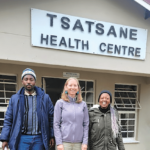The Christian Health Association of Lesotho (CHAL), a key pillar of healthcare delivery in Lesotho for over 45 years, especially in remote and underserved areas, has sounded the alarm over the deteriorating state of its services due to a breakdown in its partnership with the government.
Speaking at a press conference on Monday, CHAL Executive Director ‘Makatleho Mohasi called for the urgent restoration of normalcy and the reinstatement of quality healthcare services across CHAL facilities.
Mohasi said for nearly two decades, a formal partnership solidified by a 2007 Memorandum of Understanding (MoU) has seen CHAL working hand-in-hand with the Ministry of Health.
“This collaboration ensured essential health services, procured by the government, reached all Basotho, regardless of their location,” she said, adding that it was now uncertain whether CHAL will continue providing quality health services.
He said there was uncertainty because the long-standing partnership between CHAL and the government is now facing an “unprecedented threat.”
Mohasi cited over a decade of escalating challenges, including persistent delays and unfavourable patterns in government disbursements, coupled with stagnant staffing levels despite increasing patient numbers and a growing disease burden.
These issues, Mohasi asserted, have led to staff burnout, attrition, and compromised patient care.
The crisis has reportedly escalated with the government’s recent unilateral decision to bypass the MoU’s agreed-upon funding model. According to Mohasi, the government has started purchasing and delivering drugs and medical supplies directly to CHAL facilities, sidelining CHAL’s role in procurement.
This move, according to Mohasi, violates the spirit and letter of the MoU, effectively reducing the organisation from a collaborative partner to a mere recipient of government directives.
“Today, we inform the nation that unless the Government of Lesotho urgently restores this partnership through meaningful dialogue and honouring its financial and governance obligations, CHAL can no longer guarantee the continued provision of health services at the levels previously delivered,” she said.
She informed the staff and wider nation that CHAL would continue to try and engage with the government on this critical matter.
She added that specifically, CHAL was requesting the government to reconsider its recent decision regarding in-kind drug procurement, to provide the full disbursement of agreed-upon funds, and to expedite the release of the first quarter tranche to alleviate significant financial shortfalls currently impacting CHAL facilities.
Meanwhile, Libete Selapane indicated that, already the health services were already compromised because there was no medication within CHAL facilities, already some of the facilities are on a go-slow because the staff had not been paid their salaries.
Selapane disclosed that although CHAL had not yet received funding for the first quarter from the government due to the unsigned addendum, CHAL had requested a budget of more than M500 million from the Ministry of Health with which they were only allocated more than M37 million.
“For many years now, the ministry of health has not increased the budget allocated to CHAL, thus impacting the quality of health services provided,” he said.
When contacted for comment, Ministry of Health spokesperson ‘Mateboho Mosebekoa said the matter was being handled at the management level and that there was no official statement to share at this stage.
Summary
- The Christian Health Association of Lesotho (CHAL), a key pillar of healthcare delivery in Lesotho for over 45 years, especially in remote and underserved areas, has sounded the alarm over the deteriorating state of its services due to a breakdown in its partnership with the government.
- “Today, we inform the nation that unless the Government of Lesotho urgently restores this partnership through meaningful dialogue and honouring its financial and governance obligations, CHAL can no longer guarantee the continued provision of health services at the levels previously delivered,” she said.
- She added that specifically, CHAL was requesting the government to reconsider its recent decision regarding in-kind drug procurement, to provide the full disbursement of agreed-upon funds, and to expedite the release of the first quarter tranche to alleviate significant financial shortfalls currently impacting CHAL facilities.

Ntsoaki Motaung is an award-winning health journalist from Lesotho, specializing in community health stories with a focus on sexual and reproductive health and rights, as well as HIV. She has contributed to platforms like “Be in the KNOW,” highlighting issues such as the exclusion of people with disabilities from HIV prevention efforts in Lesotho.
In addition to her journalism, Ntsoaki serves as the Country Coordinator for the Regional Media Action Plan Support Network (REMAPSEN). She is also a 2023 CPHIA Journalism Fellow.









